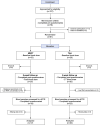Effects of Mindfulness-Based Cognitive Therapy on Peripheral Markers of Stress and Inflammation in Older-Adults With Depression and Anxiety: A Parallel Analysis of a Randomized Controlled Trial
- PMID: 35002817
- PMCID: PMC8739479
- DOI: 10.3389/fpsyt.2021.804269
Effects of Mindfulness-Based Cognitive Therapy on Peripheral Markers of Stress and Inflammation in Older-Adults With Depression and Anxiety: A Parallel Analysis of a Randomized Controlled Trial
Abstract
Background: Depression and anxiety are prevalent in older-adults and often difficult to treat: up to 55% of patients are unresponsive to pharmacotherapy. Mindfulness-Based Cognitive Therapy (MBCT) is a promising treatment, however, its biological mechanisms remain unknown in older-adults. Methods: We examined if, in older-adults, decreased depression and anxiety symptoms after MBCT are associated with changes in the expression levels of C-reactive protein, Interleukin-1β, Monocyte chemoattractant protein-1 and mineralocorticoid receptor compared to treatment as usual (TAU). Older-adults (age ≥60) with depression and anxiety were randomized to MBCT or treatment as usual. Gene expression levels from blood samples were measured using quantitative polymerase chain reaction (n = 37) at baseline and after 8-weeks of MBCT or TAU. Results: As previously published, we found a significant reduction in symptoms of depression F (1, 35) = 10.68, p = 0.002, partial η2 = 0.23 and anxiety F (1, 35) = 9.36, p = 0.004, partial η2 = 0.21 in geriatric participants following MBCT compared to TAU. However, the expression levels of measured genes were not significantly different between groups and were not associated with changes in depression and anxiety symptoms. Conclusion: Our results suggest that the symptom reduction following MBCT in older-adults may not be accompanied by changes in the stress-response and inflammatory pathways. Future research should address other potential biological alterations associated to MBCT that may be responsible for the reduction of symptoms.
Keywords: anxiety; biomarkers; depression; geriatric; inflammation; mindfulness based cognitive therapy; stress.
Copyright © 2021 Belliveau, Nagy, Escobar, Mechawar, Turecki, Rej and Torres-Platas.
Conflict of interest statement
The authors declare that the research was conducted in the absence of any commercial or financial relationships that could be construed as a potential conflict of interest.
Figures



Similar articles
-
Continuation Sessions of Mindfulness-Based Cognitive Therapy (MBCT-C) vs. Treatment as Usual in Late-Life Depression and Anxiety: An Open-Label Extension Study.Int J Geriatr Psychiatry. 2020 Oct;35(10):1228-1232. doi: 10.1002/gps.5360. Epub 2020 Jul 3. Int J Geriatr Psychiatry. 2020. PMID: 32525235 Clinical Trial.
-
Mindfulness-based cognitive therapy for patients with chronic, treatment-resistant depression: A pragmatic randomized controlled trial.Depress Anxiety. 2018 Oct;35(10):914-924. doi: 10.1002/da.22788. Epub 2018 Aug 8. Depress Anxiety. 2018. PMID: 30088834 Free PMC article. Clinical Trial.
-
Mindfulness-Based Cognitive Therapy for Late-Life Depression: a Randomised Controlled Trial.East Asian Arch Psychiatry. 2021 Jun;31(2):27-35. doi: 10.12809/eaap2075. East Asian Arch Psychiatry. 2021. PMID: 34987115 Clinical Trial.
-
Mindfulness-based cognitive therapy for residual depressive symptoms and relapse prophylaxis.Curr Opin Psychiatry. 2016 Jan;29(1):7-12. doi: 10.1097/YCO.0000000000000216. Curr Opin Psychiatry. 2016. PMID: 26575299 Free PMC article. Review.
-
Mindfulness-based cognitive therapy for bipolar disorder: A systematic review and meta-analysis.Psychiatry Res. 2020 Aug;290:113116. doi: 10.1016/j.psychres.2020.113116. Epub 2020 May 25. Psychiatry Res. 2020. PMID: 32480120
Cited by
-
Current Perspectives on Pharmacological and Non-Pharmacological Interventions for the Inflammatory Mechanism of Unipolar Depression.Brain Sci. 2022 Oct 18;12(10):1403. doi: 10.3390/brainsci12101403. Brain Sci. 2022. PMID: 36291336 Free PMC article. Review.
-
Transcriptomics and psychotherapy: An integrative review.Brain Behav Immun Health. 2024 Sep 16;42:100867. doi: 10.1016/j.bbih.2024.100867. eCollection 2024 Dec. Brain Behav Immun Health. 2024. PMID: 39881816 Free PMC article. Review.
-
Electrophysiological correlates of mindfulness in patients with major depressive disorder.Front Neurosci. 2022 Oct 13;16:971958. doi: 10.3389/fnins.2022.971958. eCollection 2022. Front Neurosci. 2022. PMID: 36312017 Free PMC article.
References
-
- World Health Organization. Depression [Internet]. World Health Organization (2021). Available from: https://www.who.int/news-room/fact-sheets/detail/depression
LinkOut - more resources
Full Text Sources
Medical
Research Materials

